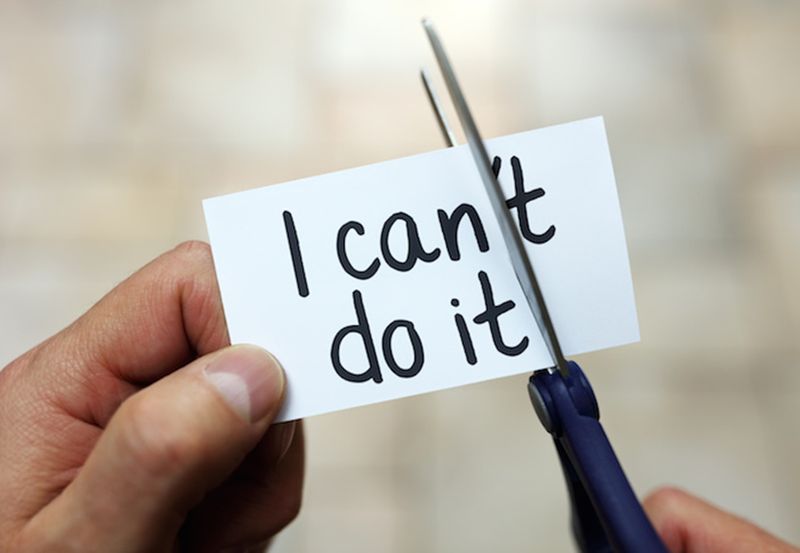Ever think you're not "good enough?"
Maybe your inner critic tells you, "I'll never master a new skill" or "I'm failing at work" or "people don't seem to like me."
You're NOT ALONE! About 85% of people worldwide have doubts about their worth and abilities.

Fortunately, there's a simple method to change that mindset — affirmations!
Affirmations are an easy approach to change those negative ideas you tell yourself into positive and supportive messages.
What are Affirmations?
Affirmations are a way to communicate positively with yourself.
Affirmations are positive statements that can help you to challenge and overcome self-sabotating and negative thoughts. When you repeat them often, and believe in them, you can start to make positive changes.

Affirmations can:
Decrease stress
Increase well-being
Improve academic performance
Make people more open to positive behavior change
Because they:
Help people resist negative thoughts about competence and self-worth
Stop the focus on negative past events
Help people see their potential for change
Boost problem-solving energy
Sample Affirmations and Their Positive Impacts
Negative thoughts about ourselves can creep into every area of our lives. Below are some common areas where these thoughts might pop up, and positive affirmation examples.
Career
Olivia thinks: "I'll never find a new job."
Each day she repeats: "I have many skills, I'm competent, and I will get hired."
Positive result: Olivia has the confidence to apply to more jobs and to write strong cover letters.
Relationships
Pierre thinks: "I'm going to be alone for the rest of my life."
Every night he says: "My family and friends love me because of who I am."
Positive result: Pierre projects happiness and security and attracts new people into his life.
Academic
Sam thinks: "I have a bad memory and I'm going to fail my exams."
Twice a day they say: "I'm smart, I've done well in the past, I can do well now."
Positive result: Sam is relaxed and confident during their exams.
Social
Kenji thinks: "When I go to parties, nobody wants to talk with me."
He set a daily pop-up on his computer that says: "I'm kind, smart, and have interesting things to say."
Positive result: Kenji feels less anxious and more confident about meeting new people.
Quiz: Yvonne's Affirmation
Yvonne struggles with self image.
She thinks: "I don't like how my body looks, I'm too curvy in some spots and too thin in others."
Each time she looks in the mirror she says: "I love my strong and healthy body."
Think about positive results that might come from her affirmation.
Quiz
Pick the behavior change below that is the most healthy reflection of her new confidence.
How to Write Affirmations that Reflect You
Affirmations are powerful when they're personal statements based in the present that are meaningful, realistic, and authentic for you.
Example
You started a job in data entry, and you made some mistakes. You may think, "I don't do anything right! I'm the worst employee!"

Use affirmations to change that mindset!
First, use prompts to list positive things about yourself:
I’m proud of myself because __.
[I meet all my deadlines]
I like myself because __.
[I help my co-workers]
I'm unique because __.
[I work hard]
I get compliments on __.
[my accuracy]
I feel strong when __.
[I try my best]

Then develop affirmations that reflect your qualities and values.
Quiz:
You work in data entry, but lately you've lost confidence in your abilities because of some mistakes you made on the job.
Which affirmation will increase your confidence in your work performance and help build resilience after mistakes?

I'm the best employee at my company.

I'm excellent at data entry and I'm a valued employee.

I will be an awesome person someday.

Coworkers like to give me compliments often.
Quiz
Which affirmation will boost your confidence and resilience?
Broader Affirmations are Powerful, Too!

Affirmations can also be more expansive to inspire general feelings of self-confidence, self-worth, and personal power. For example, you can say things like:
"I am always enough."
"I am valuable."
"I have gifts."
"I love myself."
Watch an excerpt of a short video below to hear several powerful affirmations.
Find the link to the full video with even more inspiring affirmations below in the Take Action section.
Develop a Practice

Repeat your affirmations often so that positive thoughts, feelings, and attitudes will replace negative self-talk.
Write your affirmations down so you can commit them to memory.
Establish a routine of when you recite your affirmations — for example, when you wake up, before bed, every time you look in the mirror, or during your lunch break.
Repeat them for at least 5 minutes each time you run through them.
Be consistent and say them every day.
Use tools to help you maintain your practice such as cards to keep with you during the day, electronic messages and reminders, or apps.
Focus on the truth in the words you say. Base them on evidence as they relate to your needs, values, and beliefs.
Take Action

Start making confidence affirmations today!
Your feedback matters to us.
This Byte helped me better understand the topic.





